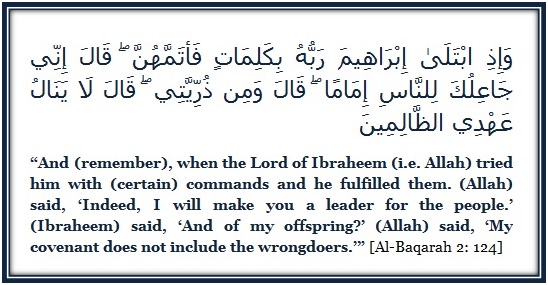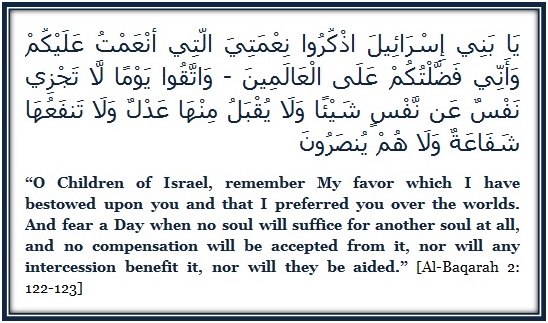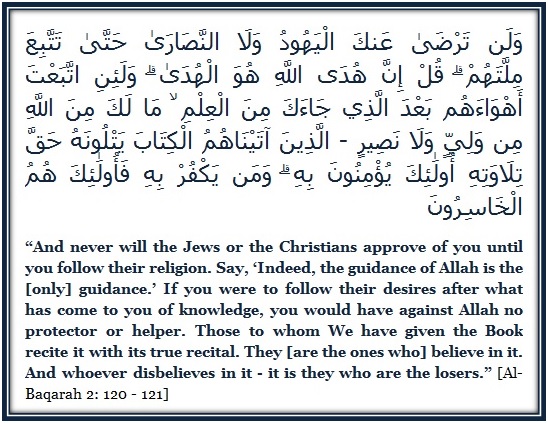Prophet Ibraheem [Abraham] – the Leader of the Mankind
 |
| Surah Baqarah Verse 124 |
Now begins the story of Prophet Ibraheem [Abraham] ‘alayhi salaam. It recounts how he was tried by Allah subhanahu wa ta’ala in different ways, how he came out of these trials successfully, and how he was rewarded.
Allah subhanahu wa ta’ala informs us of the honor of Ibraheem ‘alayhi salaam who He made an Imam for the people, and a model to be imitated, because of the way he conducted himself and adhered to Tawheed. This honor was given to Prophet Ibraheem when he adhered to Allah’s decisions and prohibitions. This is why Allah said, “And (remember) when the Lord of Ibraheem (i.e., Allah) tried him with (certain) commands.”
The word ibtala [ابْتَلَىٰ] is from the root ba-laam-wau and it means ‘to try, prove or test’. A similar word appears in ayah 49, bala which we translated as ‘a great trial’.
The ayah means, O Muhammad! Remind the polytheists and the People of the Scriptures, who pretend to be followers of the religion of Ibraheem, while in reality they do not follow it, while you, O Muhammad, and your followers are the true followers of his religion; remind them of the commands and prohibitions that Allah subhanahu wa ta’ala tested Ibraheem with. He fulfilled those orders thereby being truthful and obedient to Allah’s legislation. About him, Allah subhanahu wa ta’ala says,
إِنَّ إِبْرَهِيمَ كَانَ أُمَّةً قَـنِتًا لِلَّهِ حَنِيفًا وَلَمْ يَكُ مِنَ الْمُشْرِكِينَ – شَاكِراً لانْعُمِهِ اجْتَبَـهُ وَهَدَاهُ إِلَى صِرَطٍ مُّسْتَقِيمٍ – وَءاتَيْنَـهُ فِى الْدُّنْيَا حَسَنَةً وَإِنَّهُ فِى الاٌّخِرَةِ لَمِنَ الصَّـلِحِينَ – ثُمَّ أَوْحَيْنَآ إِلَيْكَ أَنِ اتَّبِعْ مِلَّةَ إِبْرَهِيمَ حَنِيفًا وَمَا كَانَ مِنَ الْمُشْرِكِينَ
“Verily, Ibraheem was an Ummah [a nation], obedient to Allah, Haneef [worshiped none but Allah], and he was not one of those who were Al-Mushrikeen [polytheists], (He was) thankful for His (Allah’s) favors. He (Allah) chose him and guided him to a straight path. And We gave him good in this world, and in the Hereafter he shall be of the righteous. Then, We have sent the revelation to you (O Muhammad saying): ‘Follow the religion of Ibraheem Haneef [Islamic Monotheism – to worship not but Allah] and he was not of the Mushrikeen.’” [An-Nahl 16: 120 – 123]
And,
مَا كَانَ إِبْرَهِيمُ يَهُودِيًّا وَلاَ نَصْرَانِيًّا وَلَكِن كَانَ حَنِيفًا مُّسْلِمًا وَمَا كَانَ مِنَ الْمُشْرِكِينَ – إِنَّ أَوْلَى النَّاسِ بِإِبْرَهِيمَ لَلَّذِينَ اتَّبَعُوهُ وَهَـذَا النَّبِىُّ وَالَّذِينَ ءَامَنُواْ وَاللَّهُ وَلِىُّ الْمُؤْمِنِينَ
“Ibraheem was neither a Jew nor a Christian, but he was a true Muslim Haneefan [Islamic Monotheism ـ to worship none but Allah alone] and he was not of Al-Mushrikeen. Verily, among mankind who have the best claim to Ibraheem are those who followed him, and this Prophet (Muhammad ) and those who have believed (Muslims). And Allah is the Wali [Protector and Helper] of the believers.” [Aal-Imran 3:67-68]
The word kalimat [كَلِمَات] is from the root ka-laam-meem which means ‘to speak or express’, but in the ayah it means laws, commandments and prohibitions.
Allah subhanahu wa ta’ala tried Ibraheem ‘alayhi salaam with certain commandments that he duly honored.
Prophet Ibraheem’s Trials
The purpose of a trial is to test the aptitude and worthiness of a man for a certain function. These trials were not like academic tests, nor were they intended to gauge mental capacities. They were to test the readiness in obeying Allah subhanahu wa ta’ala and the steadfastness in submitting to His commandments. This helps us to see that what really has a value in the eyes of Allah subhanahu wa ta’ala is not theoretical hair-splitting, but actual deeds, within and without.
Let us now relate the story of some of the trials of Ibraheem ‘alayhi salaam.
Since Allah subhanahu wa ta’ala intended to raise Ibraheem ‘alayhi salaam to a specially exalted station among the prophets, and to confer on him the title of Khaleel-ullah [Allah’s intimate friend], he was made to go through severe trials. Not only his people, but his own family also was sunk deep in idol-worshiping. In opposition to their creed and customs, he was given Al-Deen Al-Haneef [the Pure Religion], and was asked to go out to his people, and to bring them back to the Straight Path.
Unflinchingly he obeyed the Divine command, and, with the courage and determination of the prophet, he set out to wage a war against idol-worship and to call them to the unalloyed worship of the One God. This obviously drew upon him the ire of his people and of their king Nimrod, who finally decided to burn him alive in a blazing fire. Seeking, as he did, nothing but the pleasure of his Lord, he gladly let himself be thrown onto the pyre.
Since he had succeeded in this test, Allah subhanahu wa ta’ala commanded the fire to cool down for him:
يَا نَارُ كُونِي بَرْدًا وَسَلَامًا عَلَىٰ إِبْرَاهِيمَ
“O fire! Be you coolness and safety for Ibraheem!” [Al-Anbiya 21: 69]
The second trial was that Ibraheem ‘alayhi salaam was asked to leave his homeland, and to migrate to Syria along with his family.
Then, he was commanded to leave even this country and migrate to Makkah with his wife Hagar and infant Isma’eel [Ishmael] ‘alayhi salaam. When they reached the barren desert which was destined to be the site of Makkah and where the Ka’abah was to be built, he was commanded to stay there. But now began a new trial, much more difficult for a man to bear. He was ordered to leave his wife and son in the desert and return to Syria.
‘The Friend of Allah’ submitted to Allah’s will and did not allow even a moment to lapse between the command and its execution. When his wife noticed that he was leaving them, she called after him, but received no reply. Not even when she demanded why he was forsaking them in a lonely desert. But she was, after all, the wife of ‘the Friend of Allah’, and could now see for herself how the matters stood. So, she asked if he had received a Divine command; only then Ibraheem ‘alayhi salaam replied that it was so. Having understood the situation, she calmly remarked: Alright! The Lord who has commanded you to part from us shall Himself look after us, and not let us be destroyed. She sat back in the desert, full of trust and peace, with the infant on her lap.
Time passed and the infant grew up. Under Divine permission, the father came to visit his wife and son. It was now that Allah subhanahu wa ta’ala chose the greatest of all possible trials – he was to slaughter his own son. Allah subhanahu wa ta’ala did not really mean to have the son slaughtered, it was only a test for the father.
In addition to those rigorous trials, a number of other restrictions were imposed on him in the shape of certain injunctions, which too, he fulfilled as devotionally. Ten of these commandments are known as the characteristics of the Fitrah and are concerned with the cleanliness and purification of the body. These ten have been made permanent injunctions for all the later Ummahs (or communities of believers) too, and the Last Prophet salAllahu ‘alayhi wa sallam has insistently commanded his followers to fulfill them.
It has been reported in Tafseer Ibn Katheer that ‘Abdullah ibn ‘Abbas radhiAllahu ‘anhu said, “Allah tested him with Taharah [purity]: five on the head and five on the body. As for the head, they are cutting the mustache, rinsing the mouth, inhaling and discarding water, using Siwak and parting the hair. As for the body, they are trimming the nails, shaving the pubic hair, circumcision and plucking under the arm and washing with water after answering the call of nature.”
Imam Muslim narrated from ‘A’ishah radhiAllahu ‘anha said that Allah’s Messenger salAllahu ‘alayhi wa sallam said,
عَشْرٌ مِنَ الْفِطْرَةِ: قَصُّ الشَّارِبِ وَإِعْفَاءُ اللِّحْيَةِ وَالسِّوَاكُ وَاسْتِنْشَاقُ الْمَاءِ وَقَصُّ الْأَظْفَارِ وَغَسْلُ الْبَرَاجِمِ وَنَتْفُ الْإِبْطِ وَحَلْقُ الْعَانَةِ وَانْتِقَاصُ الْمَاءِ وَنَسِيتُ الْعَاشِرَةَ إِلَّا أَنْ تَكُونَ الْمَضْمَضَة
“Ten are among the Fitrah [instinct, natural constitution]: trimming the mustache, growing the beard, using Siwak, inhaling and then exhaling water (in ablution), cutting the nails, washing between the fingers (in ablution), plucking the underarm hair, shaving the pubic hair, washing with water after answering the call of nature, (and I forgot the tenth, I think it was) rinsing the mouth (in ablution).”
‘Abdullah ibn ‘Abbas radhiAllahu ‘anhu also said that thirty elements make up the whole of Islam, ten of which have been mentioned in Surah At-Tawbah, the other ten in Surah Al-Ahzab, and the last ten in Surah Al-Mu’mineen.
Surah At-Tawbah lays down the characteristic of true believers:
► Those who repent,
► Those who worship Allah,
► Those who praise Allah,
► Those who fast,
► Those who bow down and prostrate themselves before Allah,
► Those who invite others to good deeds and forbid evil deeds,
► Those who observe the limits of Allah.
In Surah Al-Ahzab it appears:
► The men and women who submit to Allah
► The men and women who believe in Islamic Monotheism
► The men and women who are obedient to Allah
► The men and women who are truthful in their speech and deeds
► The men and women who are patient is performing all their duties and abstaining from all that Allah has forbidden
► The men and women who are humble
► The men and women who give Sadaqat
► The men and women who fast
► The men and women who guard their chastity
► The men and women who remember Allah much with their hearts and tongues
The qualities mentioned in Surah Al-Mu’mineen are:
► Those who show humility in their Salah
► Those who turn away from Al-Laghw [dirty, false, evil vain talk, falsehood and all that Allah has forbidden]
► Those who pay the Zakat
► Those who guard their chastity
► Those who are faithfully true to their Amanat [responsibilities and trusts] and to their covenants
► Those who strictly guard their prayers
What degree of success did Ibraheem ‘alayhi salaam attain in these trials? The Qur’an defines his accomplishment in these words: “And Ibraheem who paid his debt in full.” (An-Najm 53:37)
As for the reward he received, the ayah itself has announced it: “He (Allah) said, ‘I am going to make you an Imam [leader] for mankind.” Allah subhanahu wa ta’ala made him a role model for the people, and an Imam whose conduct and path are imitated and followed.
The Arabic word Imam, lexically signifies ‘leader or chief or guide.’ Since the present ayah is related to Ibraheem ‘alayhi salaam, the word Imam in this context means ‘a prophet’, though it also includes the general sense of ‘leadership’. Prophethood cannot be won through personal effort; all the same, a prophet has to display his perfection in the thirty qualities we have just referred to.
Why are People tested?
– It is to assuage their capabilities. How much potential does one have?
– It is to assess their sincerity. Is someone true in their statement or is it simply a verbal declaration?
– It is to help them recognize their potential and rise up to a higher level.
The Unjust do not Qualify for Allah’s Promise
Ibraheem ‘alayhi salaam asked, “And from my offspring?” He was informed that Allah’s covenant was not for the wrongdoers. By saying this, Allah subhanahu wa ta’ala informed Ibraheem ‘alayhi salaam that there will be unjust people among his offspring. They will not benefit from Allah’s promise, nor would they be entrusted with anything, even though they will be among the children of Allah’s Khaleel [intimate friend, Prophet Abraham].
There will also be those who do good among the children of Ibraheem, and these it is who will benefit from Ibraheem’s supplication. Ibn Khuwayz Mindad Al-Maliki said, “The unjust person does not qualify to be a Khalifah, a ruler, one who gives religious verdicts, a witness, or even a narrator (of ahadeeth).”
Lessons:
Leadership is not a legacy to be transferred on to the children after one’s death. One has to strive and qualify for leadership through his skills and not lineage. Lineage will not benefit anyone unless one has righteous deeds and correct faith.
Prophet Ibraheem is a leader for mankind and a role model to be imitated. He did not submit to anyone besides Allah subhanahu wa ta’ala. He did not allow love for his family, his people or his country to stop him from adhering to the commands of Allah subhanahu wa ta’ala. What about us? How many excuses do we have for now obeying Him? Sometimes, we blame it on the children and sometimes on our families and peers. Nothing stopped Ibraheem ‘alayhi salaam from carrying out the commands not even the love for the son that he left in infancy.
We also learn the importance of supplicating for our children. Many a times, we make du’a for ourselves and forget our children or we make du’a for their dunya and forget their Deen. Wouldn’t you want to raise righteous children and leave them behind as your continuous charity? Wouldn’t you want the company of your children in the Hereafter? Don’t forget making du’a for you success in this world and the next, and for your children as well.
When a person submits to the commands of Allah subhanahu wa ta’ala, He opens up multiple doors of goodness for him.
Apparently, tests are painful but without going through trials wheat is not sifted from the chaff. It is through challenges that a person’s skills refined.
Abu Huraira radhiAllahu ‘anhu narrated that the Prophet salAllahu ‘alayhi wa sallam said, “Trials will continue to befall the believing man or woman in himself, his child and his wealth until he meets Allah with no sin on him.” [Tirmidhi]
In another narration, the Prophet salAllahu ‘alayhi wa sallam said, “When Allah wills good or His slave, He hastens the punishment for him in this world, and when Allah wills ill for His slave, He withholds the punishment for his sins until he comes with all his sins on the Day of Resurrection.” [Tirmidhi]
Therefore, one should be a patient in his trials. They are a mean to cleanse us and save us from the punishment of the Hereafter. Also through the trials, Allah subhanahu wa ta’ala is teaching us something. The real question is: Are we paying attention?
The Prophet salAllahu ‘alayhi wa sallam said, “No tiredness, exhaustion, worry, grief distress or harm befalls a believer in this world, not even a thorn that pricks him, but Allah expiates some of his sins thereby.” [Bukhari, Muslim]
Tests reveal are true identity. Will we be patient or are we going to turn bitter and utter bad words about Allah subhanahu wa ta’ala and His creation? When Ibraheem ‘alayhi salaam was tested we see no bitterness on his part. Rather, he kept excelling in his tests. It is not that we should ask for trials but in tests too we should display excellence. The One Who is testing you will provide relief.
Ibraheem ‘alayhi salaam was tested in almost all matters of life: parents, family, country, wife, children and so on. He endured patiently for the sake of Allah subhanahu wa ta’ala. Through this Allah subhanahu wa ta’ala teaches us that in order to become His, He first breaks us and then reshapes us to become a better person. He cleanses us of our false attachments and allows us to perceive the reality of things.
May He grant us the Hikmah [wisdom] to understand these matters, ameen.
















